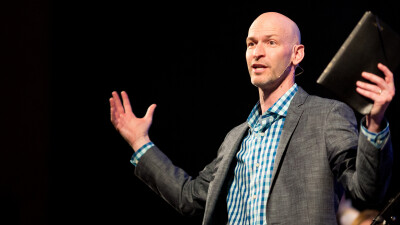Contentment. Lack of contentment. Those are such loaded words, aren’t they? In certain circumstances, a feeling of discontent can be a great motivator. On a cultural level, our country was founded because of a lack of contentment with the way things were. But when it comes to personal finances, a lack of contentment can be a really bad thing! That impulse purchase that you had to have (but didn’t really need), the vacation that you really wanted (but can’t afford), homes, cars, etc. We can all fall victim to things like these because we get frustrated with our current situation. That lack of contentment takes hold and we give in to the notion that this new item will make us feel better and happier. I’m not saying any of those items are inherently bad, it’s our motivation that’s the problem.
This is such an important issue for all of us, because these purchases come at a big cost. Not only is there the cost of the item, but also the lasting damage financially. Often, debt is used to fund this whirlwind, putting a big demand on our future earning and spending. Those demands also impact our ability and/or willingness to give. Thinking even longer term, because we have spent our money on these things, we aren’t saving enough for long term obligations, like kid’s college and retirement. Did you know the average 401k balance in the U.S right now for those in the 50-59 age group is around $144,000? A good rule of thumb is that you can withdraw 4% of your account balance to live on in retirement, so that the account doesn’t get spent down. This means that the “average” person in their 50’s should only count on getting $5,760 a year from that account. That will not cut it in retirement! So where do we go from here?
Did you know that the Bible references money and possessions over 2,000 times? It is mentioned more than prayer, more than hell, and more than faith. Why? Because we need it! Martin Luther wrote, “There are three conversions necessary: the conversion of the heart, the conversion of the mind, and the conversion of the purse.” If we profess to be follows of Christ, or at least seeking out and investigating his claims, then it only makes sense that we take his advice.
His advice is far reaching, but also very practical:
Saving – The wise store up choice food and olive oil, but fools gulp theirs down. (Proverbs 21:20)
Debt- The rich rule over the poor, and the borrower is slave to the lender. (Proverbs 22:7)
You were bought at a price, do not become slaves of human beings. (1 Corinthians 7:23)
Giving- “Will a mere mortal rob God? Yet you rob me. “But you ask, ‘How are we robbing you?’ “In tithes and offerings. 9 You are under a curse—your whole nation—because you are robbing me. 10 Bring the whole tithe into the storehouse, that there may be food in my house. Test me in this,” says the Lord Almighty, “and see if I will not throw open the floodgates of heaven and pour out so much blessing that there will not be room enough to store it. (Malachi 3:8-10)
And now the tie-in—contentment: “Keep your lives free from the love of money and be content with what you have, because God has said, ‘Never will I leave you; never will I forsake you.’”(Hebrews 13:5) and “But godliness with contentment is great gain. For we brought nothing into the world, and we can take nothing out of it.” (1 Timothy 6:6-7)
So if we open ourselves to God’s advice on our stuff, how do we start? If it was with a list of rules, we’d start out fine, but at some point we would run out of gas. It needs to start with the heart. We need to let God go to work in our heart, and adopt his vision for stuff and money. He chooses to give to each of us what we have (which won’t be the same as someone else), and our job is to be happy with what he gives us, and to be a faithful steward with it. And guess what happens when that message sinks in? We find that we are becoming content with what we have. And when we aren’t constantly chasing after the next thing to bring us happiness, then we have freed ourselves to tackle some of the bigger priority things like increasing (or starting) our giving to God’s priorities, paying down debt, and saving for kid’s college and retirement. Imagine a wave of Christians who, because they have faithfully saved for retirement, are now free to serve in great ways because they no longer need to work for a paycheck. Or the freedom for a young adult to graduate college without $100,000+ in debt. That could have a powerful impact on this world.
It is important to remember that contentment doesn’t just happen. Even the Apostle Paul references this, when he says “for I have learned to be content whatever the circumstances” in Philippians 4:11. This won’t happen overnight. It is going to require some effort, but the benefit is that if we can learn this, we can step down from the treadmill of stuff and wants. And as we realize those things have less of a hold on us, we can engage in things that are more meaningful, give our resources to God’s priorities, and our priorities will start to reflect His. That can have an impact not just today, but for eternity.
